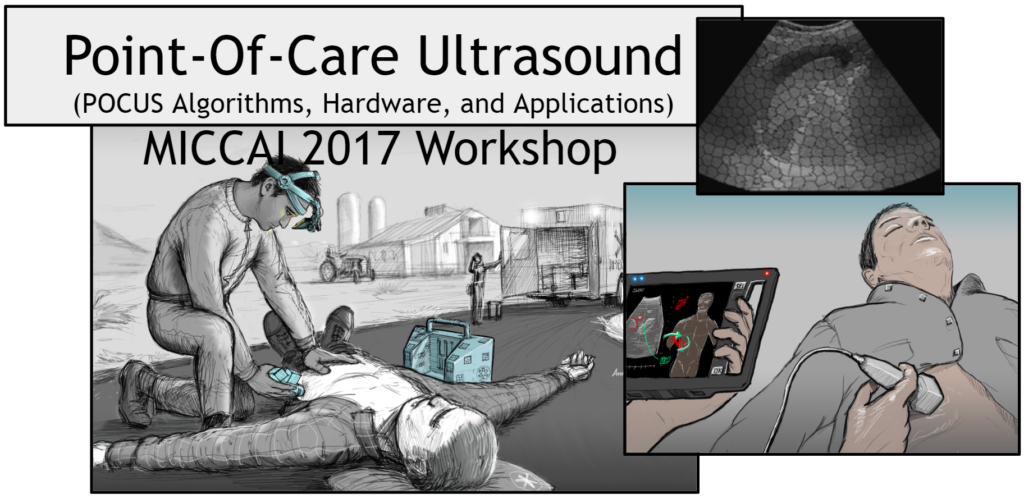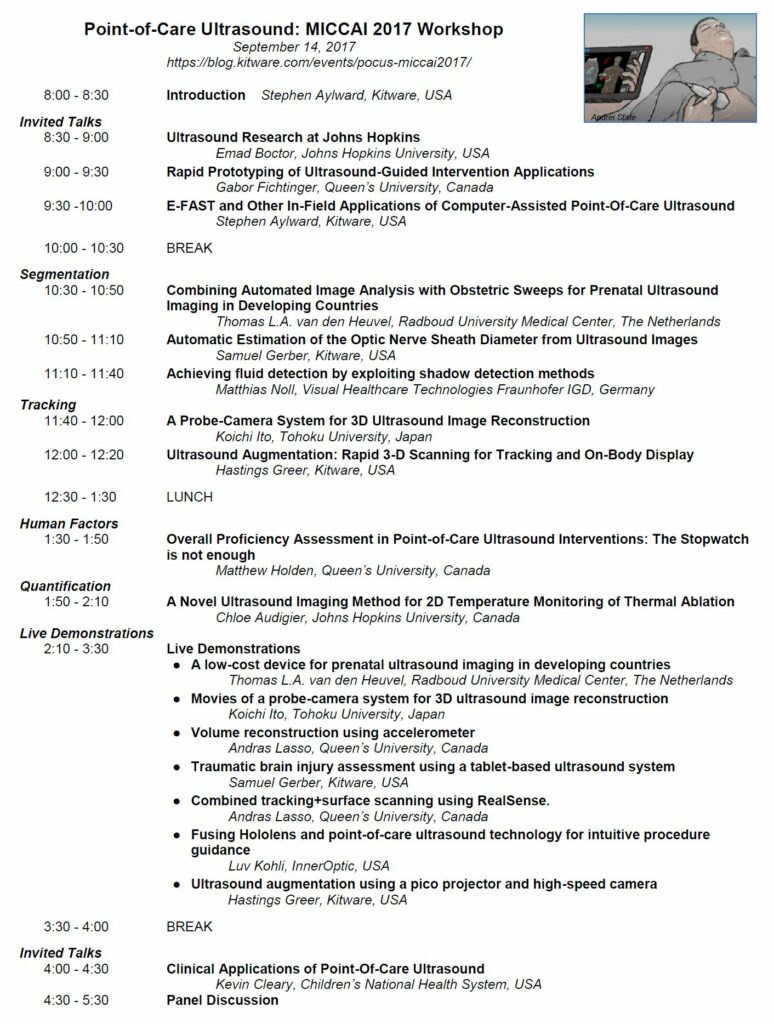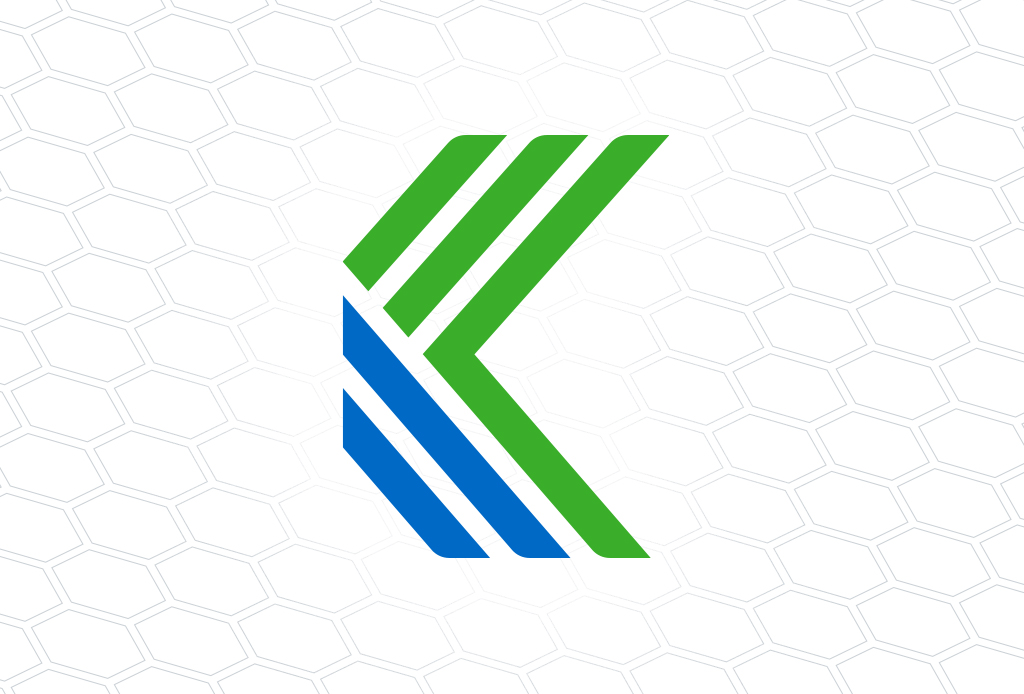
About • Dates • Organizers and Speakers • Program • Submissions • Venue
Presentations from the workshop are available! (link)
The premise of this full-day MICCAI workshop is that for the full potential of point-of-care ultrasound (POCUS) to be realized, POCUS systems must be approached as if they were new diagnostic modalities, not simply as inexpensive, portable ultrasound image systems.
This workshop is dedicated to the research and clinical evaluations of the technologies specific to POCUS. POCUS involves automated data analyses, rugged hardware, and specialized interfaces to guide novice users to properly place and manipulate an ultrasound probe and interpret the returned ultrasound data. In particular, the output of a POCUS system should typically be quantitative measures and easy-to-understand reformulations of the acquired data, not b-mode images; it should be assumed that the expertise needed to interpret b-mode images will not be readily available at the points of care.
Image analysis algorithms as well as tracking and systems engineering are essential to POCUS applications. Example applications include detection of intra-abdominal bleeding by emergency medical services (EMS) personnel for patient triage at the scene of an accident, diagnosis of increased intra-cranial pressure by medics using computer-assisted measurement of optic nerve sheath diameter, and monitoring of liver tissue health in the homes of at-risk patients. At the workshop, attendees will learn from leaders in POCUS research via oral and poster presentations as well as via live demonstrations and a panel discussion.
About
The workshop aims to support and grow the community of POCUS researchers at the Medical Image Computing and Computer Assisted Intervention (MICCAI) conference. Accordingly, the workshop represents a blending of MIC and CAI.
Topics of interest include the following:
- self-contained or easy-to-setup probe tracking systems for in-field use;
- three-dimensional ultrasound reconstruction from imprecisely tracked two-dimensional probes;
- clinical studies of in-field POCUS applications;
- adaption of advanced ultrasound protocols to low-cost probes;
- ultrasound guidance algorithms and interfaces for novice users;
- automated ultrasound image quality assessment;
- tissue characterization in POCUS applications;
- longitudinal registration of POCUS data;
- workflows and interfaces for novice POCUS users, including augmented reality (AR) and virtual reality (VR) displays;
- hardware packaging for rugged, in-field ultrasound applications; and
- simulation strategies for rapid training of EMS personnel and medics for POCUS applications.
The organization of this workshop is supported, in part, by NIH/NIBIB and NIH/NIGMS via 1R01EB021396-01A1: Slicer+PLUS: Point-of-Care Ultrasound
Dates
June 19 – Submission Deadline (Completed)
July 7 – Notification of Acceptance (Completed)
July 17 – Camera-Ready Papers Due, with Confirmed Workshop Registration (Completed)
August 1 – Final Program Published (Completed: See below or download PDF)
September 14 – Full-Day Workshop
Organizers and Speakers
The workshop organizers represent academic, industry, and clinical leaders in the field of POCUS. InnerOptic is a medical device innovator for ultrasound applications. The clinical leaders include an emergency medicine physician, a trauma surgeon, and an orthopedic surgeon from Washington University and Children’s National Medical Center, all of whom are participating in the investigation of POCUS applications. Queens University, Johns Hopkins University (JHU), Brigham and Women’s Hospital (BWH), and Kitware have open-source packages that are being adopted to POCUS applications.
The workshop organizers are as follows:
- Stephen Aylward, Kitware
- Emad Boctor, JHU
- Gabor Fichtinger, Queens University
- Kevin Cleary, Children’s National Medical Center
- Matt Oetgen, MD, Children’s National Medical Center
- Deborah Kane, MD, Washington University
- Bradley Freeman, MD, Washington University
- Luv Kohli, InnerOptic
- Sonia Pujol, BWH
Final Program (PDF)

Available Presentations
- Invited: Rapid Prototyping of Ultrasound-Guided Intervention Applications
Gabor Fichtinger, Queen’s University, Canada (PDF) - Invited: E-FAST and Other In-Field Applications of Computer-Assisted Point-Of-Care Ultrasound
Stephen Aylward, Kitware, USA (PPTX) - Combining Automated Image Analysis with Obstetric Sweeps for Prenatal Ultrasound Imaging in Developing Countries
Thomas L.A. van den Heuvel, Radboud University Medical Center, The Netherlands (PDF) - Automatic Estimation of the Optic Nerve Sheath Diameter from Ultrasound Images
Samuel Gerber, Kitware, USA (PPTX) - A Probe-Camera System for 3D Ultrasound Image Reconstruction
Koichi Ito, Tohoku University, Japan (PDF) - Ultrasound Augmentation: Rapid 3-D Scanning for Tracking and On-Body Display
Hastings Greer, Kitware, USA (PDF) - Overall Proficiency Assessment in Point-of-Care Ultrasound Interventions: The Stopwatch is not enough
Matthew Holden, Queen’s University, Canada (PPTX) - A Novel Ultrasound Imaging Method for 2D Temperature Monitoring of Thermal Ablation
Chloe Audigier, Johns Hopkins University, Canada (PDF) - Keynote: Clinical Applications of Point-Of-Care Ultrasound
Kevin Cleary, Children’s National Health System, USA (PPTX)
Paper Submission, Live Demonstrations, and Paper Publications
Paper Submissions
The organizing committee will judge the papers based on potential impact on patient care, innovation, and methodological soundness. MICCAI standards regarding conflicts of interest during review, duplicate publications, and scientific/human-subject ethics will be maintained.
Each paper is submitted via email to stephen.aylward@kitware.com and should include the following:
- In the body of the email please provide
- Title
- Responsible author, affiliation, and email address
- Brief description of the associated live demonstration or an indication that there is no associated live demonstration.
- Preference for oral or poster presentation
- Attached to the email please provide a PDF of the submitted extended abstract / full paper in MICCAI format
Live Demonstrations
Both poster and podium presenters will have the opportunity to provide live demonstrations. The live demonstrations are anticipated to include not only image analysis demonstrations but also POCUS probes connected to laptops to demonstrate innovations for 1) tissue characterization using gel-based phantoms, 2) embedded tracking systems, and 3) intuitive AR/VR displays.
Publication
Springer has agreed to publish our papers as part of the MICCAI workshop proceedings. Papers will appear in a volume in Springer’s Lecture Notes in Computer Science (LNCS) series.
Venue
Physical Event
The Québec City Convention Centre
1000 Boulevard René-Lévesque E, Québec, QC G1R 2B5
